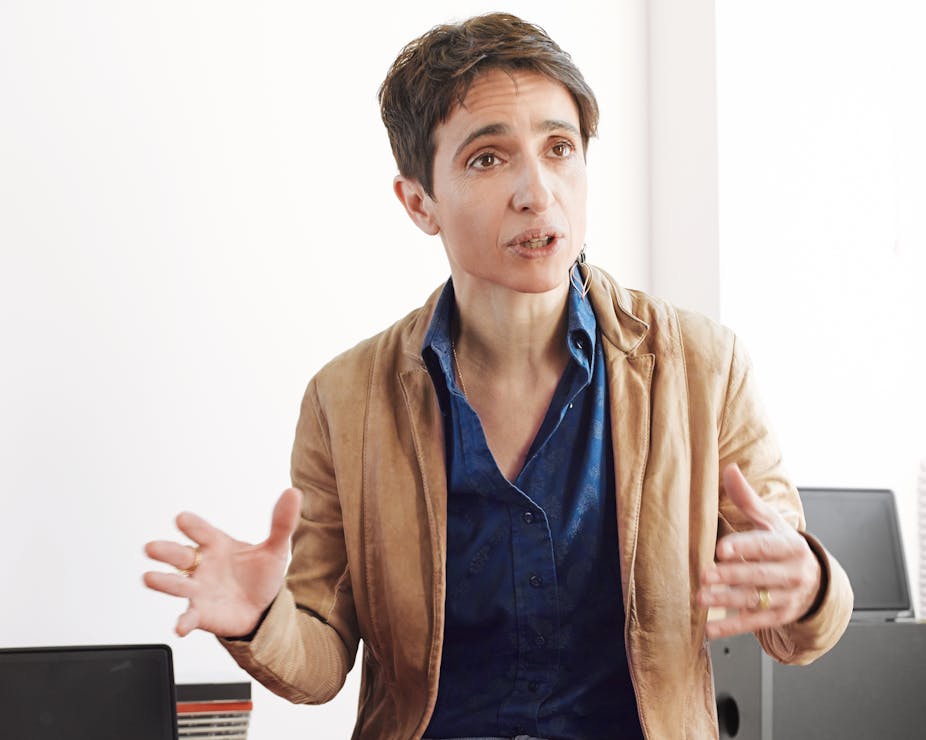Judith Armstrong spoke with Gessen when she was in Melbourne as a guest of the Melbourne Writers’ Festival last week. You can listen to the extended interview here.
In her biography of Vladimir Putin, The Man Without a Face, Masha Gessen, a bilingual journalist, writer, and long-standing critic of Putin, begins with a sketch of a physically small boy who learns to defend himself by fisticuffs and aggro.
Later he finds his niche in the all-powerful KGB. Thanks mainly to politics’ abhorrence of a vacuum, he comes to fill a position of unforeseen power, from which he tries to propagate his own “post-ideological nostalgia” for the Soviet era. More recently he has adopted a new strategy, which is, quite simply, to prosecute an ideological war against the West.
She is tough, determined in her books and interviews to open the eyes of the West to what we shrug off, preferring not to see. She scorns our well-intentioned impulse to dehumanise the enemy: of course Russians “love their children”, as Sting posited, just like us, but there is one huge difference. We have not been brainwashed by 70 years of totalitarianism.
We underestimate Putin because we fail to understand an important aspect of his ideology: Western values are irrelevant to those Putin wants for Russia. He sees himself as protecting the values of traditional Russian civilization against those of a civil society - freedom of expression, and a code of human rights.
In Gessen’s view all traditional thinking upholds an anti-democratic status quo. Even if some dissenters try to promote the plurality of democratic voices, they do not constitute an oppositional “side”. The brief moment of democratic idealism expired as Putin’s authority grew; but there were and are other players, in Gessen’s view, such as:
Chechnya: Proof of Russia’s unwillingness to enter, let alone embrace, a post-imperial era was shown during Medvedev’s presidency, when unmarked, purportedly Azeri, planes dropped Russian bombs on Chechnya, and armoured personnel carriers full of Russian marines poured in. Their origins, routinely denied, were revealed only if they were caught.
Mikhail Khodorkovsky: The treatment of this former oligarch is emblematic. Putin sought to shut down all the oligarchs after their rise to wealth and power by insisting they either give up their assets or leave the country. Khodorkovsky, head of Yukos Oil and a self-taught liberal committed to the creation a more civil society, would do neither. But annexation of his oil empire was integral to Putin’s interests, and so therefore was his silencing – via arrest, false charges, and long imprisonment.
The Russian Orthodox Church: Unlike the crusading role of some Western religions, this Church is hand-in-glove with the regime. Traditionally it does not criticise or oppose government policy, but colludes in its implementation. The Pussy Riot protest was directed precisely against the mutual alliance between Putin and the Orthodox Church.
Ukraine: Gessen warns that similar tactics to those employed in Chechnya are now being used in Ukraine; she expresses disgust that Russian soldiers are sent to die anonymously. But again, there is a difference. In Chechnya, Russia was trying to crush the independence of a breakaway region; this time the real target is not Ukraine but the West. But Putin turns everything to his own advantage.
It must be said that not every Russia-watcher would put it this way. There is also a view that the Russian people who support him are more interested in regaining some of their lost Soviet empire and resultant loss of face than in entering another war with the West. But it is hard to see how a Ukrainian David can beat this Goliath without escalating international involvement.
Social media: Gessen is adamant that social media is not a force for public opinion, although many Westerners see it as such. It creates nothing. It may help connections “bubble up”, but in a country where personal opinion was silenced for 70 years, the number of people seeking to communicate with alternative voices is very small.
The future: Gessen is pessimistic about the likelihood of change, but not because of any long-term strategy on Putin’s part. In her opinion, he thinks no further then six weeks ahead. Why six weeks? Because that was the length of time between his realisation that the US intended to punish Russia by sending only low-level officials to Sochi, and the start of “his” Winter Olympic Games extravaganza. His own panic reaction led him to release individuals with high public profiles, such as Khodorkovsky and the Pussy Riot girls, while people with no profile were being jailed as usual.
Western predictions about the durability of Putin’s regime: Gessen acknowledges that his system must ultimately fail, since all regimes do. But while allowing that Putin’s game is in its terminal stages, she asks how long it will take for this “slow war” to end.
Is Putin training up an heir? No. As Gessen has already pointed out, he only thinks six weeks ahead.
There is of course justifiable apprehension about what can happen in the next six weeks; but while Gessen is outstanding in her wide experience, penetrating perceptions, and her ability to punch home her convictions, two things are worth keeping in mind.
One is the paradoxical effect of a Soviet childhood; the other, the virtue of listening to different voices.
Listen to Judith Armstrong’s full interview with Masha Gessen here.

